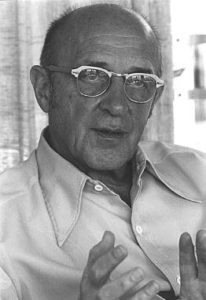Carl Rogers

Carl Ransom Rogers (* January 8, 1902 in Oak Park, Illinois, suburb of Chicago; † February 4, 1987 in La Jolla, California) was an American psychologist and psychotherapist whose outstanding achievement was the development of person-centered psychotherapy (also: client-centered psychotherapy) and the expansion of humanistic psychology.
Today, the person-centered approach created by Rogers is an integral part of both the conversation in therapy sessions and the general conversation in everyday educational work with clients.
In contrast to Freud, Carl Rogers emphasized the uniqueness of the individual. He placed particular emphasis on encounters in a fully human sense – i.e. including the emotional level, non-verbal expressions and mutual goodwill in principle. He developed the concept of encounter as well as the definition of “feeling” that leads to empathy, i.e. an attitude of understanding listening:
Feeling is a spontaneous inner reaction within me – to a person, a place or a situation that I experience or think about.
Roger’s particular concerns were
- good mutual relationships between parents and their children and
- stable, trusting relationships between spouses that can continue to grow even in the face of conflict.
Unlike many other psychotherapists, Rogers saw the good in people from the outset. Quote: Man is good.
His work, characterized by a humanistic view of man, had an impact on many areas of applied psychology, sociology, education, social work, pastoral care and medicine.
The person-oriented approach by Carl Rogers
The person-oriented approach (PoA) is a method developed by the famous American psychologist Carl Rogers (1902 – 1987). The special feature of this approach is that it focuses on the person and not on a specific problem, illness or symptom.
PoA is based on the belief that human beings have a strong potential for evolution and innate fulfillment that develops on its own when they benefit from a favorable context. It is therefore about restarting this spontaneous process that has been inhibited.
The immense popularity of PoA is as much due to Carl Rogers’ revolutionary thinking as it is to his personal influence. This American educational psychologist rejected the main psychological currents of his time, Freudian psychoanalysis and behaviorism, to forge his own theory. He was the first practitioner to make audio and video recordings of his sessions and to carry out research into the therapeutic process and its results. He also introduced supervision for therapists. By emphasizing personal qualities rather than diplomas, he opened psychotherapy to non-medical professions and developed the helping relationship (counselling). This approach became famous in the 1960s as the “non-directive” method.
The author, lecturer and researcher Carl Rogers was interested in all aspects of human relationships: the couple, the family, teaching, social and political life. His work completely changed the art of listening, not only in the helping professions, but also in communication, business and commerce.
In this person-centered approach, the therapist strives to create a reassuring climate, to facilitate the expression of his “client”, to teach him to rely on what he feels in order to develop his autonomy and improve his relationships with others.
Let’s replace the word “patient” with the word “client “
Carl Rogers replaced the word “patient” with “client” to emphasize the active role of the latter: only he knows what suits him, so it is up to him to guide the therapeutic process. The therapist cannot replace himself in any way, so he does not impose, give advice or interpret, but accompanies the person in his development and change work.
